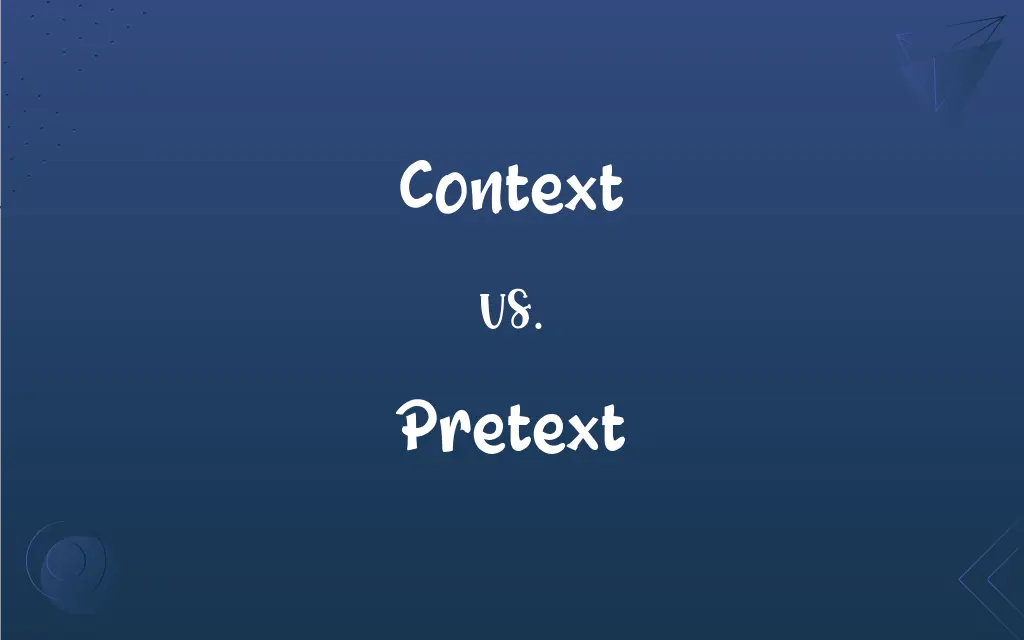Context vs. Pretext: What's the Difference?
Edited by Harlon Moss || By Janet White || Updated on October 2, 2023
"Context" refers to the circumstances or background that surround a situation or event, while "Pretext" is a false reason given to justify an action.

Key Differences
"Context" is the framework or circumstances that give meaning to words, events, or actions. For example, a joke may be funny in one context and offensive in another. "Pretext," on the other hand, is a deceptive reason or cover story used to hide the real motive behind an action. It can be a fabrication or a distortion of facts.
Both "Context" and "Pretext" serve different grammatical roles and have unique usages. While "context" generally functions as a noun to describe background conditions, "pretext" also serves as a noun but specifically describes a false or misleading reason.
In terms of frequency, "context" is commonly used in various fields, such as linguistics, history, and data analysis. "Pretext" is also a common term but primarily occurs in situations involving deception, secrecy, or justification for actions that might otherwise be questionable.
In essence, "context" is neutral and is used to clarify or explain, while "pretext" carries a connotation of deception or falsification. When someone asks for the context, they seek clarity; when someone provides a pretext, they might be attempting to deceive.
Comparison Chart
Part of Speech
Noun
Noun
ADVERTISEMENT
Connotation
Neutral
Often deceptive
Usage Frequency
Broad
More specific
Fields of Use
Various
Primarily deception
Function
Clarification
Justification
Context and Pretext Definitions
Context
The circumstances surrounding an event.
The context of the meeting was to discuss budget cuts.
ADVERTISEMENT
Pretext
A deceptive claim.
Her pretext for leaving was false.
Context
The settings and conditions that influence a situation.
The political context shaped the decision.
Pretext
An ostensible reason hiding the true motive.
The campaign was a pretext for gaining political support.
Context
The background against which something is interpreted.
In the context of the story, her actions made sense.
Pretext
A false reason given to justify an action.
She used the pretext of needing to study to avoid the party.
Context
The relationship and organization of elements in a situation.
The context of these events is critical for understanding.
Pretext
A smokescreen to mask the real issue.
The argument was just a pretext for deeper issues.
Context
The part of a text or statement that surrounds a particular word or passage and determines its meaning.
Pretext
A cover story or excuse.
He went under the pretext of being a tourist.
Context
The circumstances in which an event occurs; a setting.
Pretext
A reason or excuse given to hide the real reason for something.
Context
The surroundings, circumstances, environment, background or settings that determine, specify, or clarify the meaning of an event or other occurrence.
In what context did your attack on him happen? - We had a pretty tense relationship at the time, and when he insulted me I snapped.
Pretext
A false, contrived, or assumed purpose or reason; a pretense.
The reporter called the company on the pretext of trying to resolve a consumer complaint.
Context
(linguistics) The text in which a word or passage appears and which helps ascertain its meaning.
Without any context, I can't tell you if the "dish" refers to the food, or the thing you eat it on.
Pretext
To employ a pretext, which involves using a false or contrived purpose for soliciting the gain of something else.
The spy obtained his phone records using possibly-illegal pretexting methods.
Context
(archaeology) The surroundings and environment in which an artifact is found and which may provide important clues about the artifact's function and/or cultural meaning.
Pretext
Ostensible reason or motive assigned or assumed as a color or cover for the real reason or motive; pretense; disguise.
They suck the blood of those they depend on, under a pretext of service and kindness.
With how much or how little pretext of reason.
Context
(mycology) The trama or flesh of a mushroom.
Pretext
Something serving to conceal plans; a fictitious reason that is concocted in order to conceal the real reason
Context
(logic) For a formula: a finite set of variables, which set contains all the free variables in the given formula.
Pretext
An artful or simulated semblance;
Under the guise of friendship he betrayed them
Context
(obsolete) To knit or bind together; to unite closely.
Context
(obsolete) Knit or woven together; close; firm.
Context
Knit or woven together; close; firm.
The coats, without, are context and callous.
Context
The part or parts of something written or printed, as of Scripture, which precede or follow a text or quoted sentence, or are so intimately associated with it as to throw light upon its meaning.
According to all the light that the contexts afford.
Context
To knit or bind together; to unite closely.
The whole world's frame, which is contexted only by commerce and contracts.
Context
Discourse that surrounds a language unit and helps to determine its interpretation
Context
The set of facts or circumstances that surround a situation or event;
The historical context
Context
Linguistic elements surrounding a word that clarify its meaning.
The word bat has different meanings depending on the context.
FAQs
Can Context be misleading?
Context is neutral but can be manipulated to distort meaning.
What does Pretext mean?
Pretext is a false reason given to justify an action or conceal the real motive.
Is Pretext always deceptive?
Generally, pretext is used to indicate deception or false justification.
What does Context mean?
Context refers to the background or circumstances that surround an event or situation.
How does Context affect interpretation?
Context provides the background that helps clarify the meaning of words or events.
Can Context be cultural?
Absolutely, cultural context can greatly influence interpretation.
Can Pretext be true?
Pretext implies falsity or deception, so a "true pretext" would be contradictory.
Is Context only used in language?
No, context can be applied in various fields like history, data analysis, and more.
Is Pretext synonymous with excuse?
While similar, pretext often implies a deceptive or false excuse.
Can Context be ambiguous?
Yes, without sufficient context, situations can be open to multiple interpretations.
Can Pretext be used legally?
Pretext can be cited in legal discussions to indicate false justifications.
Is Context a noun?
Yes, context is primarily used as a noun.
Is Pretext a noun?
Yes, pretext is used as a noun.
Does Context change?
Context can vary depending on various factors like time, place, and situation.
Is Pretext always planned?
Generally, a pretext is preconceived to serve as a justification.
About Author
Written by
Janet WhiteJanet White has been an esteemed writer and blogger for Difference Wiki. Holding a Master's degree in Science and Medical Journalism from the prestigious Boston University, she has consistently demonstrated her expertise and passion for her field. When she's not immersed in her work, Janet relishes her time exercising, delving into a good book, and cherishing moments with friends and family.
Edited by
Harlon MossHarlon is a seasoned quality moderator and accomplished content writer for Difference Wiki. An alumnus of the prestigious University of California, he earned his degree in Computer Science. Leveraging his academic background, Harlon brings a meticulous and informed perspective to his work, ensuring content accuracy and excellence.































































